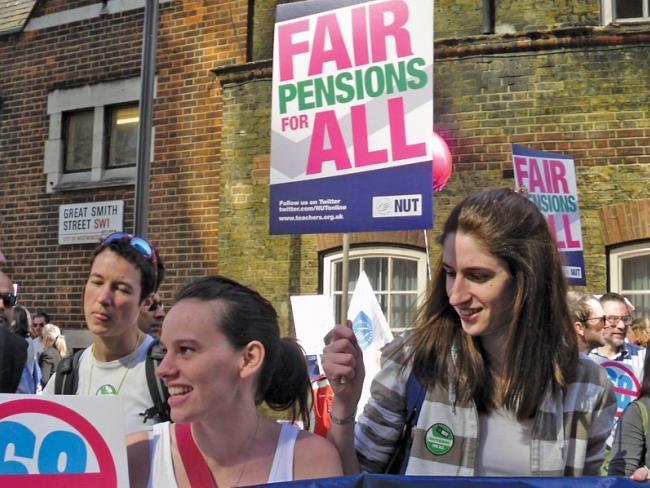
Young NUT members marching for pensions, 28 March 2012. Photo Workers
Young workers today face unemployment and working longer than ever – and still being poor in retirement…
Workers leaving school or university now have to pay individually to fund a non-guaranteed pension due in forty years’ time. That would seem an odd idea to previous generations of British workers.
A universal state pension was introduced in 1946, paid for out of National Insurance contributions. And from that time an increasing number of employers operated company pension schemes to which they contributed. The result was that workers no longer expected poverty when they retired and many could retire before they were too old to work.
Yet young workers today have lost that expectation through a combination of personal pension contributions, limited workplace pension provision and a constant attack on state pension benefits. In effect pension funding has become a part of a young worker’s discretionary spending. Should they regularly go out for an evening with friends or commit to a private pension contribution? If young workers fail to come to grips with this question they are accused of a lack of engagement with their own pension planning. What an oppressive choice.
It doesn’t end there. The mantra of “we are all living longer” recited by successive governments and most economists has been used to justify much later retirement ages and the closure of many quality workplace pension schemes.
Too poor to retire
As a result there are now over one million people working beyond age 65 who cannot afford to retire. And at the same time over one million of our youth are at a loss to find meaningful full-time employment. It is self-evident that if older workers stay longer in the labour force this must reduce the chances and opportunities of younger prospective workers.
Quite simply, the continuous increase in retirement age has deliberately intensified youth unemployment. More and more young workers are affected by those who should have retired but financially are not in a position to do so (and those who can afford to retire but want to carry on working).
‘If older workers stay longer in the labour force it must reduce the chances of younger workers in the labour market.’
Successive pensions policies have amounted to an open attack on older workers while at the same time being part of a covert war on the younger age bracket. This malice is cheered on by advocates of working beyond a civilised retirement age as a victory over “ageism”. And governments are happy to see groups of workers blaming each other for their problems.
Current longevity figures are projections, estimates. The fact is that living standards and mortality rates are closely linked. Low wages plus low pensions will simply equate to impaired lives while at work, followed by early death during retirement. Capitalists despise workers, especially when non-productive. Their policy for pensions can be summed up as “just push off and die”.
Intergenerational pension funding based on a mutual respect between young and old, much higher state pensions payable at an earlier retirement age and the assimilation of young workers into production are all integral features of the type of national planning that workers need. Trade unions ran pension schemes before 1946 because the state would not. That may not be the way now, but unions need to take up the issue again, more widely than the few excellent but isolated disputes at employer level.
